I had had a strong desire to visit the Kings Romans Hotel, a Chinese-owned project in the Laotian section of the Golden Triangle, where Myanmar, Thailand and Laos meet, for a long time. The purpose of the visit was not to gamble in a casino but to witness the living conditions of about 40,000 illegal Myanmar migrant workers, who, unlike those in Thailand, had never received official visas to work there.
Another reason was that, following the announcement by U Thein Swe, Union Minister for Labor, Immigration and Population, that the government was planning to sign a memorandum of understanding (MOU) to officially send workers to Laos in order to give them protection, nothing had been heard about the plan.
During a recent trip to Chiang Mai, I got the opportunity to visit the casino, crossing there via Thailand.

Under US sanctions
High-rise buildings in the Laotian casino city can be seen from across the Mekong River in Chiang Saen, in Thailand’s Chiang Rai province. One might think superficially that the scenery in the Golden Triangle region, long notorious for cultivating poppies and heroin smuggling, had changed dramatically.
The founder of the casino, Chinese businessman Zhao Wei, cooperated with the Laotian government to implement the project. He said he would build a casino and a special economic zone (SEZ) to attract tourists and help develop the impoverished region. The Laotian government cooperated with him.
The Laotian government granted him a land lease for an area of 30 square miles for 75 years, according to a 2015 research paper by Pinkaew Laungaramsri of Chiang Mai University, but other researchers said the land was on a 99-year lease. Zhao promised that the area would be a trade hub by 2020 complete with a five-star hotel, an entertainment center, a casino, banks, a golf course, schools, a hospital, an airport, a jetty and other services.
Ten years after the project started, the US Treasury Department’s Office of Foreign Assets Control (OFAC) imposed sanctions on four people—Zhao, his wife, an Australian and a Thai—for serious illicit activities. The US government announced that Hong Kong-based Kings Romans International (HK) Co. Ltd had expanded its business into Southeast Asia and the administration traced drugs seized by Thai, Laotian and Chinese authorities since 2014 to the casino.
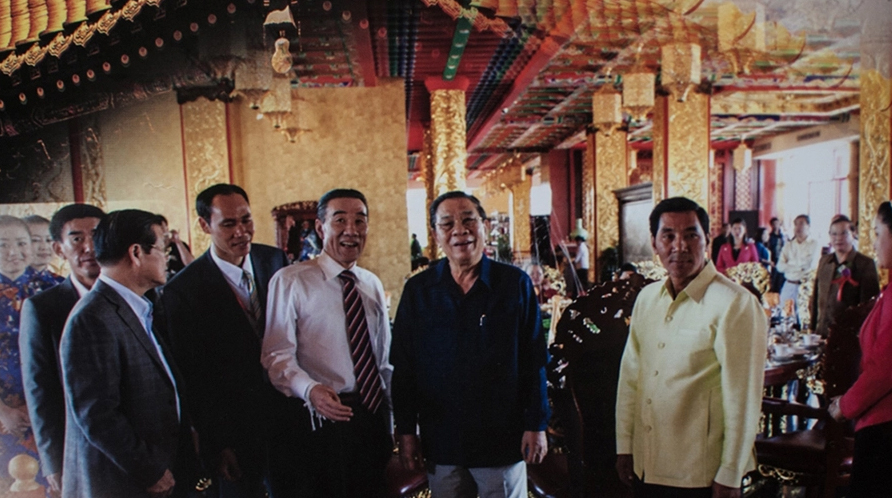
Before he started operating the casino in the Golden Triangle, Zhao operated a casino in Mongla Autonomous Region in eastern Myanmar. Authorities in Yunnan, China, forced the casino to shut down. As in Mongla, he initially engaged in the illegal wildlife trade in the Laotian casino city. However, he gave up smuggling of wildlife after the Laotian government forced him to do so because of American sanctions and the attention of the international media. I did not see smuggling of wildlife when I was there.
A Chinese colony
As soon as I set foot there I felt as if I were in a Chinese colony. Chinese standard time was used in the city. Chinese currency was used in the city. Vehicle license plate numbers were written in Chinese. Signboards were written in Chinese. Everything gave a hint of Chinese influence.
An irony was that Chinese capitalists expelled local residents from their land by giving compensation under a poverty-elimination development project approved by the communist Laotian government. According to Pinkaew’s paper, local residents had to struggle to get proper compensation for their houses, plantations, farms and crops between 2008 and 2012. The Chinese company offered them US$2,000 (3.06 million kyats) to $2,500 per household and between $26,000 and $34,000 to those who owned houses, plantations, farms and crops.
Appraisals and negotiations were made by local administrators on behalf of the Chinese company. Village heads played a main role in negotiations between the government, the Chinese company and villagers. The Chinese company paid a daily allowance to village heads for negotiations.
One term of the agreement between the Laotian government and the Chinese company—to employ Laotians in 90 percent of construction work of the development project—was later ignored. It was suspected that the Chinese company bribed Laotian authorities to get complete control of labor management at the casino. Then the Chinese company began hiring Myanmar workers en masse.
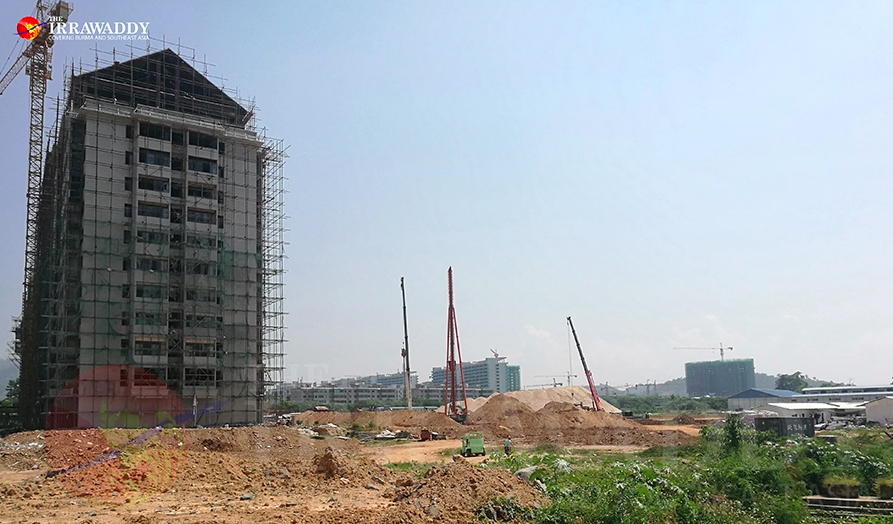
It is difficult to know the official number of workers there, as investors could easily get the right to labor management without registering with the Laotian government, according to a report written by researcher Chris Lyettleton of Macquarie University in Australia, in 2011. It is possible this was behind the failure to achieve progress in signing the MOU to protect workers between the Myanmar and Laotian governments.
Crossing the border illegally
Some Chinese tourists were queuing at the Thai immigration checkpoint in Chiang Saen noisily. When I applied for a reentry visa to Thai immigration authorities, I was denied it because I had only a 14-day visa to Thailand. I tried desperately to negotiate with authorities as it would be a waste of time, money and effort to return without going to the other side of the border.
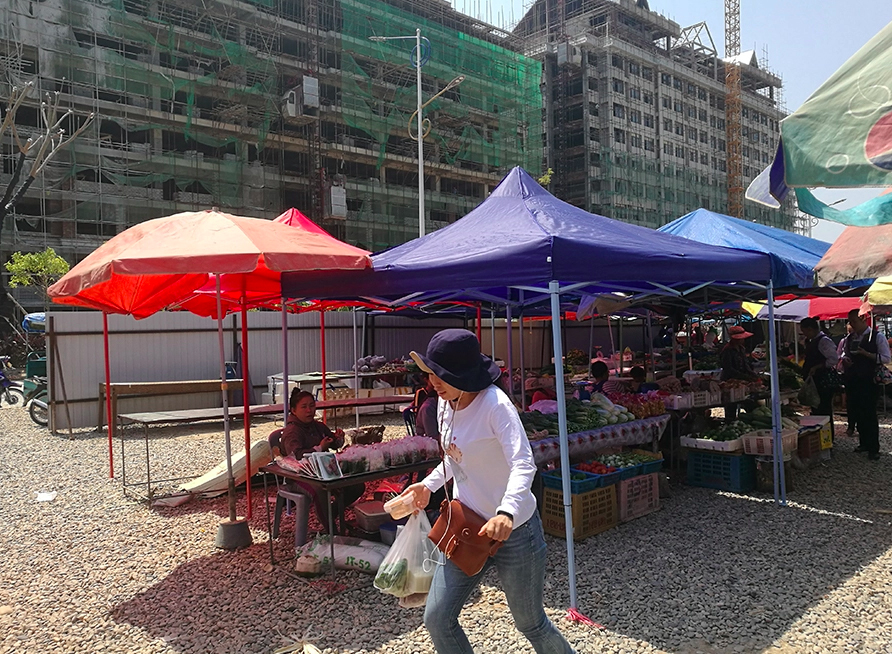
At last, Thai immigration allowed me to cross the border after leaving my passport with them, filling the border crossing form and paying border crossing fees. I chartered a boat to cross the border and come back. They said there was a Laotian market where one could visit and shop without a Laotian visa on the other bank and I could stay there about an hour.
As assistants to Thai immigration also told me that tourists without visas could go to the casino from the market, I decided to go to the casino without any visa documents. There were many ferries for tourists with Laotian visas to get to the Laotian immigration checkpoint. I could see some Myanmar workers in casino uniforms working on the ferries. As I didn’t have the visa, I crossed the Mekong River with a speedboat operated by Thais.
Myanmar workers came to Laos from the Wanpon jetty in Tachilek to get to the casino. They had to pay 10,000 kyats to Myanmar immigration, 5,000 kyats for a ferry and 10,000 kyats to Laotian immigration to cross the border, according to them.
As soon as I reached the opposite bank from Chiang Saen, the first thing greeting me were the initials CCCC (China Communications Construction Company). The jetty was built by CCCC. It reminded me of the New Yangon City Project to be implemented by the CCCC with land provided by the regional government, without having to make any investment in the project. Is the cash-stripped Myanmar government handing out development projects to Chinese businessmen in the same way the impoverished Laotian government did?
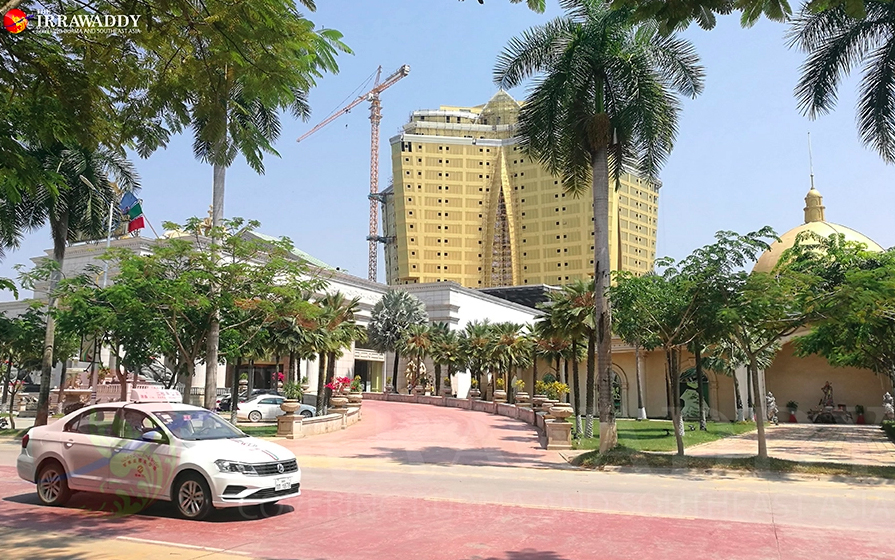
The Laotian market was just up the jetty. Although it was called the Laotian market, most of the souvenirs sold there were from Thailand and Myanmar. I saw three Myanmar salesgirls wearing Thanakha at a jade-ware shop. I greeted them in Burmese, saying “Mingalarpar”. They were from Naypyitaw, Taunggyi and Bago respectively and had been there for about two-and-a-half years.
When I asked them about their jobs, they said it was OK. I asked them if I could walk to the casino but they said I could take a taxi too. The taxis were driven by Chinese people and they had Chinese plate numbers. As I didn’t have Chinese yuan and I wanted to talk to Myanmar workers along the road, I walked towards the five-star hotel where the casino was located.
Inside the casino
As I walked along the China-Laos Friendship Road by the river I saw buildings under construction, new restaurants, Karaoke lounges and the China-Laos Friendship Monastery. I turned towards an unfinished 12-story building at a junction. When I walked in front of the structure, I could see Myanmar workers sitting in a row and a Chinese man standing and talking to them. As I was a stranger, I decided not to go to them and turned into the market built of temporary shelters.
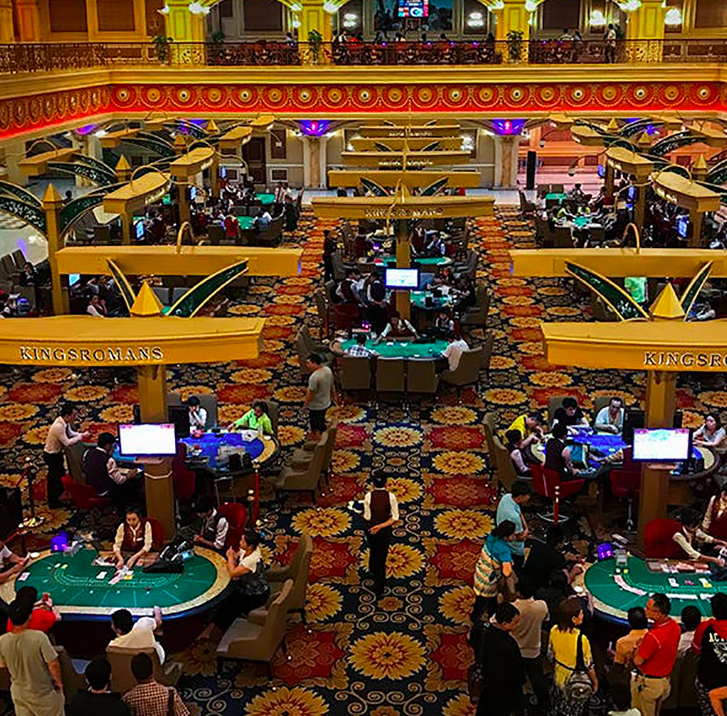
There were many people in the fresh market. Laotians sold goods and Chinese and Myanmar people bought them. When I talked to a shopkeeper, I learnt that vegetables, fish and meat in the market were imported from Thailand to resell at the market.
As soon as I walked out of the market, I was on the road leading to the casino. The nearer the road approached the casino, the better it became and it was complete with a paved surface, rows of trees, sidewalks and traffic lights that were not working. Four or five cars were parked in front of the grand casino hall decorated with big statues of lions and Roman and Greek sculptures. When I walked past the gate, security guards checked my bag and allowed me to go inside.
The first thing I saw after walking past the security point was a wide staircase which divided into left and right and a Myanmar family posing for a photograph on the second floor. I didn’t make for the stairs and went directly to the casino hall. I was wondering where the noisy Chinese tourists I saw at the Thai immigration checkpoint were, as there were only a few people playing.
Most of the Chinese people who come to the casino are from regions with fewer job opportunities in Yunnan Province, according to the research paper by Chiang Mai University. It was learnt that there were more people coming to work in the special economic zone than to play in the casino.
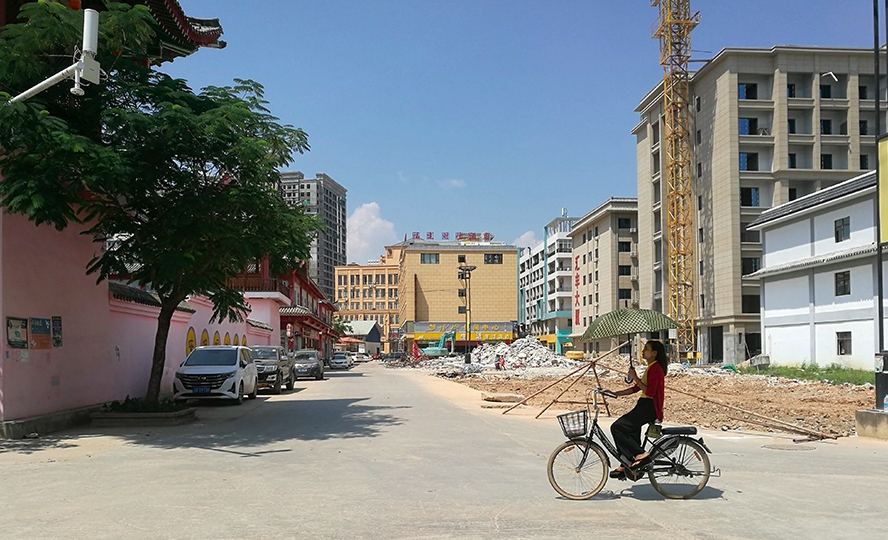
The casino employs about 2,000 Chinese, Laotian and Myanmar workers, two thirds of whom are from Myanmar and work in various sections as card dealers, game assistants, cleaners and kitchen workers. Card dealers earn as much as 650,000 kyats per month and assistants from 350,000 to 400,000 kyats per month while cleaners, most of whom are women, get the least. All of them had to wear casino uniforms properly and were fluent in Chinese.
As I was a complete stranger to casino games, I asked a dealer how to play, speaking in Burmese, and they explained it. An assistant who thought I was going to play brought me a glass of lime juice, but I was just looking at the players around me. A player next to me complained in Burmese that he had never won a game, and left. A Laotian woman replaced him and won twice. I told her in Thai that she was lucky, but she replied that she had been losing a lot the whole morning.
To the ‘Myanmar village’
Leaving the casino, I had lunch at a restaurant in “China Town”, which is a long building designed to resemble ancient Chinese architecture. As I didn’t have much time to catch the ferry coming from Thailand, I asked Myanmar workers at a construction site by the road if I could get a cyclist to take me to the jetty. I was glad to hear that I could get one in the Myanmar village.
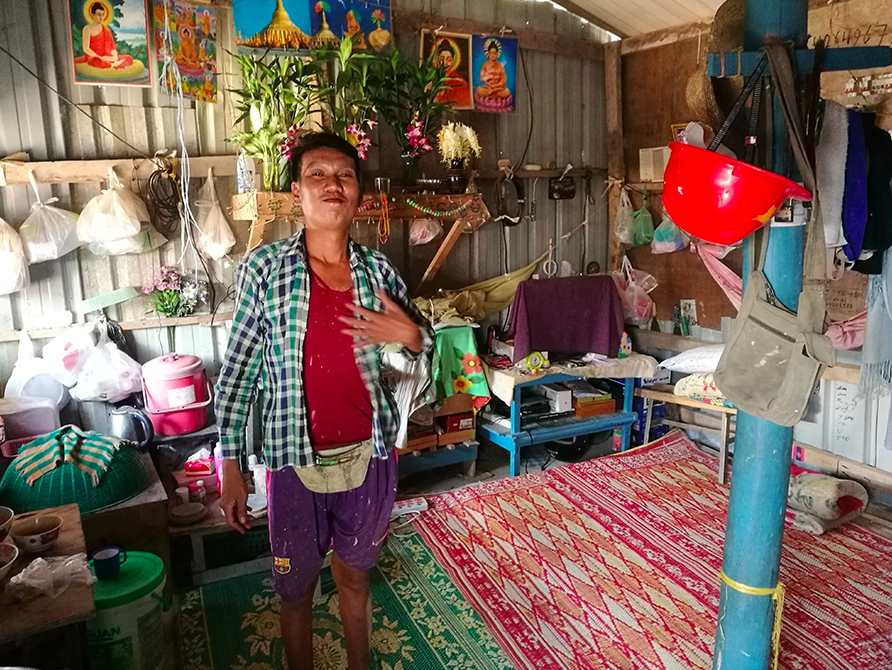
I was glad because the Myanmar village was the place I most wanted to visit after the casino. My pace quickened. After walking about 200 meters, the path led to a road next to a building under construction. Next to the site were rows and rows of so-called houses built of plywood and other material available that looked like matchboxes. Yes, that was the Myanmar village.
Before crossing the road to the Myanmar village, I went to a group of people who were sitting in circles beside an elephant statue. People who were sitting in circles were playing cards and those next to the statue were workers waiting for potential employers. As I saw a motorbike near them, I asked them whether I could get a cyclist to take me back to the jetty. The crowd gathered around me.
Some of them asked me for 100 yuan but I told them that the fare was very expensive and I could afford only 100 baht. They replied that they used yuan there, not baht. Meanwhile, a man came out of the crowd and showed me the motorbike key, saying it was his and I didn’t need to negotiate with the others. When I told him I wanted to take a look at the lives of Myanmar workers, he said, “I am Myo Gyi from Mandalay. I have been here for about 10 years and know everything you want to ask. I will take you to the village and my house.”
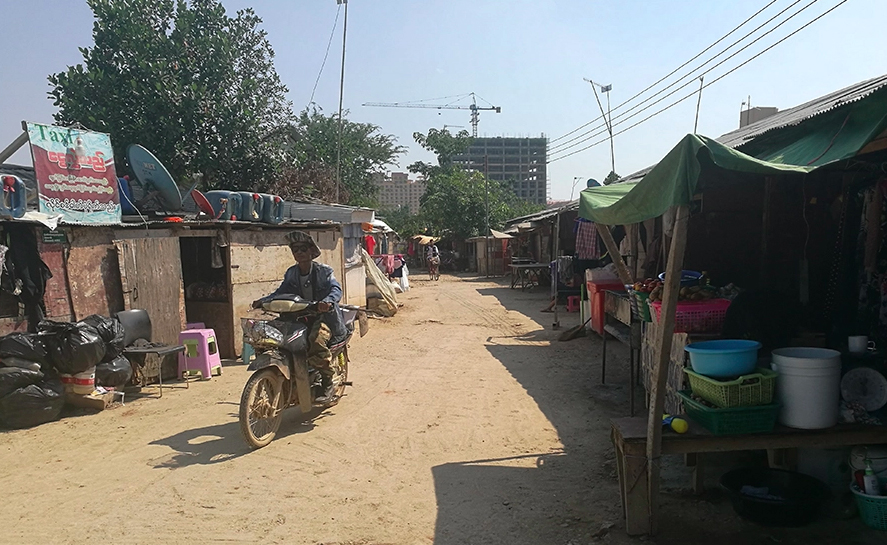
I sat on his bike’s back seat and went to the village. I was visiting a ward that looked rather like a refugee village. On both sides of the road were tea houses, food stalls, tire and tube repair shops, barber shops and groceries. When we turned form the main earth road into a path with potholes just wide enough for a motorcycle, he stopped his bike and told me this was his house.
As I saw the house number, I asked him if it was housing provided by Laotian authorities and he said yes. It was a “matchbox” house of 15 feet by 15 feet and full of kitchen utensils, clotheslines, and other household items with a phone on a table. Laotian authorities had provided them with a house, a toilet and electricity supply. When I asked him how they were getting on, he said it would be impossible to earn as much as 1,000,000 kyats in Mandalay as a bricklayer, and he and his wife had been working there to remit money to relatives in Pyigyitagun in Mandalay Region, who were taking care of their son, a sixth-grader.
When he said, “We cannot save as much money as before as the yuan was depreciating,” I asked him why he didn’t work officially in Thailand, where labor rights were guaranteed. He laughed and said that they could enjoy so much more freedom that they could even play cards in the street and they did not want to work in Wa Region and Mongla, where they could earn more. I explained to him that the Myanmar government was negotiating with its Laotian counterpart to protect Myanmar migrant workers there. He said, “I think that is why Laotian police no longer arrest and blackmail us. If they ask us to apply for passports, we will have to. It is also said that they are preparing to expel us all soon.”
As his wife was working as a housemaid at a Chinese house, I was not able to see her. He said, “The former house she worked for made fake computers and phones. After Laotian police raided the house, she had to work for another Chinese family.” I began to realize what kind of special economic zone Zhao had built for the Laotian government.
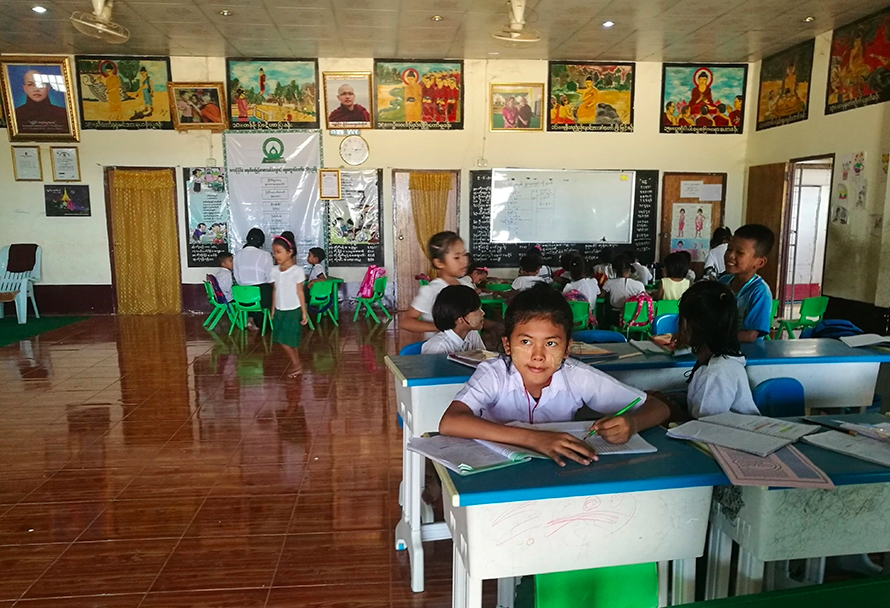
After we had talked for some time, he offered to take me to the philanthropic school opened at a monastery. When I arrived at the monastery, I felt as if it were an oasis in an arid desert. I found four female teachers teaching 71 students in a brick building of 40 feet by 40 feet. Ko Myo Gyi introduced me to the headmistress, who told me that no one wanted to work at the school as salaries for the teachers were lower than in other jobs.
As I had to catch the boat to Thailand in time, I bade farewell to the headmistress and went back. While we were waiting for the boat at the jetty near the Laotian market, I asked Ko Myo Gyi what happened to Myanmar workers when they got sick. He said, “It depends entirely on the fate of the victim. We can get treatments for minor illnesses from philanthropic groups but when we sustain injuries at work, it depends entirely on our own fate.” Then he showed me a scar on his calf and said, “It was accidentally caused by a rock-cutting saw at work. I had to get treatment at Tachilek Hospital for 11 days.”
When I gave him money for the bike fare, he refused to accept it, saying he had made up his mind not to from the moment he picked me up after the card game. “No one has come to us to look at our lives like you. I have wanted to talk about my life for a long time,” he said. When the boat docked at the jetty, he saw me off and said he would never forget me, holding on to a post at the jetty.
#IRWLaborRights
You may also like these stories:
Myanmar Citizens Out of Luck Under Proposed Gambling Law
HK Readies for More Protests as World Leaders Urge Restraint
Mall or Park? In Crowded Bangkok, ‘Last’ Open Space Stirs Debat

















